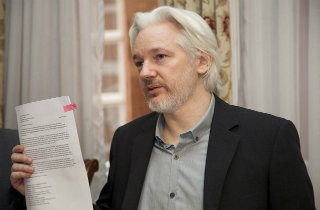 WASHINGTON (AP) — Two media reports say U.S. prosecutors are preparing or closely considering charges against the anti-secrecy group WikiLeaks, including its founder Julian Assange, for revealing sensitive government secrets.
WASHINGTON (AP) — Two media reports say U.S. prosecutors are preparing or closely considering charges against the anti-secrecy group WikiLeaks, including its founder Julian Assange, for revealing sensitive government secrets.
CNN reported Thursday that authorities are preparing to seek Assange’s arrest. The Washington Post reported prosecutors are weighing charges against the organization’s members after the Obama-era Justice Department declined to do so.
Possible charges include conspiracy, theft of government property and violating the Espionage Act, the newspaper said, though any charges would need approval from high-ranking officials in the Justice Department.
The move comes after WikiLeaks last month released nearly 8,000 documents that it says reveal secrets about the CIA’s cyberespionage tools for breaking into computers, cellphones and even smart TVs. It previously published 250,000 State Department cables and embarrassed the U.S. military with hundreds of thousands of logs from Iraq and Afghanistan.
CIA Director Mike Pompeo last week denounced the group as a “hostile intelligence service” and a threat to U.S. national security. And Attorney General Jeff Sessions told reporters Thursday that Assange’s arrest is a priority as the Justice Department steps up efforts to prosecute people who leak classified information to the media.
“We’ve already begun to step up our efforts and whenever a case can be made, we will seek to put some people in jail,” Sessions said.
Their condemnation of WikiLeaks differed sharply from President Donald Trump’s past praise of the organization. Before last year’s election, Trump said he was happy to see WikiLeaks publish private, politically damaging emails from Hillary Clinton’s campaign manager, John Podesta. He was less thrilled about the release of CIA tactics, which the White House said was different because it involved information about secretive national security tools.
The Post reported that it wasn’t clear whether prosecutors are also looking at WikiLeaks’ role in the Podesta case.
Assange’s attorney, Barry Pollack, told The Associated Press authorities have not apprised him of the status of their investigation.
Assange, an Australian, has resided the last four years in Ecuador’s embassy in London. He received political asylum after skipping bail to avoid extradition to Sweden, where he is wanted over a rape allegation. Ecuador’s recently elected presidential candidate has promised to continue to harbor Assange, allowing him to avoid arrest.
Assange has said WikiLeaks acts in the name of liberty and privacy. The Post reported that Justice officials in the Obama administration believed prosecuting WikiLeaks would be similar to prosecuting a news organization for publishing classified information, but they did not formally close the case.
“The Department of Justice should not be treating the publication of truthful information as a reason for a criminal investigation of the publisher,” Pollack said. “Democracy has always depended on journalists being able to inform the public of what their government is doing.”
But Pompeo said WikiLeaks’ activity went beyond the First Amendment, alleging the group was involved in obtaining secret material, rather than just reporting information leaked to it.
WikiLeaks “directed Chelsea Manning to intercept specific secret information,” Pompeo said last week, according to CNN, referring to the case of the former Army intelligence analyst convicted of leaking the hundreds of thousands of documents that made WikiLeaks a household name. “And it overwhelmingly focuses on the United States.”